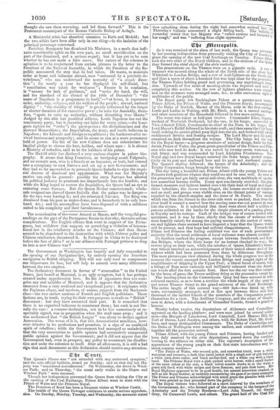A Ministerial crisis has absorbed attention in Paris and Madrid;
but the two elks have been alike only in one thing—in the isolation of the principal personage concerned. President Bonaparte has dismissed his Ministers, in a mode that indi- cates considerable spirit on his own part, no small mortification on the part of the dismissed, and a serious sequel ; but it has yet to be seen whether he has not made a false move. The nature of the schemes in agitation is to be conjectured from certain phrases in the letter to the President of the National Assembly, in which the President of the Re- public announced the step that he had taken. He wants, to maintain order at home and influence abroad, men "animated by a patriotic de- votedness," who can understand the necessity of " a single direc- tion"; for nearly a year he has displayed his self-denial, but " conciliation was taken for weakness "; France is in confusion, is"uneasy for lack of guidance," and "seeks the hand, the will, and the standard of the elected of the 10th of December ": "the name of Napoleon is a programme in itself,"—" at home, it represents order, authority, religion, and the welfare of the people ; abroad, national dignity " : "the stability of things " is greatly influenced by the longer or shorter duration of the executive power ; he asks the Assembly, there- fore, "again to raise up authority, without disturbing true liberty." Judged by this able but jesuitical address, Louis Napoleon has cut the reactionary party, but is throwing out baits for every other,—the bour- geois sighers for "order'; the parti-prilAre ; the disciplinarians and the abstract Monarchists ; the Imperialists, the army, and rustic believers in Napoleon ; the Liberals and foreign sympathizers ; the hankerers after re- vived business and prosperity; and he seems to aim at a more permanent hold of power. The list of his new Cabinet does not substantiate his implied pledge to choose the best, boldest, and wisest men : it is almost a Ministry of nobodies, said to be the habitues of his palace.
The Madrid affair has disclosed a very curious chapter in palace bio- graphy. It seems that King Francisco, an intriguing monk Fulgencio, and an ecstatic nun, who is a fanatic or an impostor, or both, bad entered into a conspiracy to oust Narvaez and set up a new Government; and they had so far succeeded as to persuade Queen Isabella to sign the requi- site decrees of dismissal and appointment. What was her Majesty's motive can only be guessed : possibly the stern Narvaez has allowed his political jealousy to penetrate too impertinently into the boudoir, and while the King hoped to restore the Inquisition, the Queen had an eye to restoring some Serrano. But the Queen Mother remonstrated ; whole- sale resignations showed Queen Isabella that the palace was in danger— for the rats were leaving it; and she reinstated Narvaez. The King was dismissed from his post as major-domo, and is henceforth to be only hus- band, &c.; and his accomplices have been disposed of with a mildness suited to his complicity and their harmlessness.


























 Previous page
Previous page